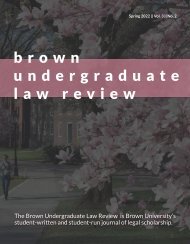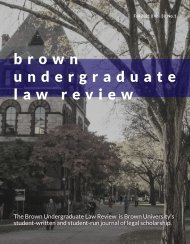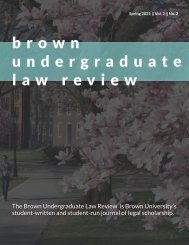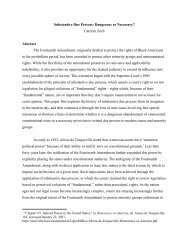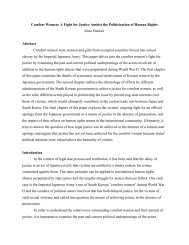Brown Undergraduate Law Review -- Vol. 2, No. 1 (Fall 2020)
We are proud to present the Brown Undergraduate Law Review's Fall 2020 issue. We hope you will all find our authors' works fascinating and thought-provoking.
We are proud to present the Brown Undergraduate Law Review's Fall 2020 issue. We hope you will all find our authors' works fascinating and thought-provoking.
You also want an ePaper? Increase the reach of your titles
YUMPU automatically turns print PDFs into web optimized ePapers that Google loves.
The Zenger Jury: A Mechanism of Legitimizing Popular Dissent
may have represented a personal vendetta against Cosby. 40 proper functioning of legal systems. While jury
Nonetheless, the jury possessed a personal interest in
preserving vocal critiques of colonial bureaucracy, a
government in which they had minimal recourse. 41 Indeed,
in a colony lacking adequate political representation,
independent military strength, and the will to denounce its
king, condemning truthful libel eliminated the last and
most accessible form of popular dissent, enabling
bureaucrats such as Cosby to continue exploiting their
subjects. Significantly, the jury?s decision did not
legitimize all criticism; men falsely accusing their
government broke their end of the social contract in failing
to remain submissive and respectful of the public ruler.
Thus, the jury?s embrace of Lockean ideology emphasized
the validity and gravity of Zenger?s grievances while
balancing protection against unwarranted ?Dislike of their
Governors.? 42
instructions imposed a more rational system than mere
emotional responses, the practice severely diminished a
jury?s power. In many libel cases where the main facts of
the libel, publication, and insult were not in question,
juries served only as a formality and litigants often waived
their rights to a jury trial. 44 Hamilton recognized the jury?s
demise, declaring that ?leaving it to the Judgement of the
Court, whether the Words are libelous or not, in Effect
renders Juries useless (to say no worse).? 45 In ignoring
instructions to reach a verdict based on traditional
standards of scandalum magnatum, the jury asserted a right
to assess the validity of legal precedent. As average
citizens, the jury represented the community of New York
City; thus, their act of jury nullification, acquitting Zenger
despite the court?s instructions, represented popular control
of the judicial system. While common folk in Europe long
appealed to the courts as mechanisms of resisting elite
In reshaping libel laws perceived as unjust, the jurors not
control and airing their grievances in a ??semi-public?
only enabled open criticism of government officials, but
forum,? the Zenger jury held the advantage of serving in
also established popular sovereignty within the judicial
an official decision-making capacity.
system. Prior to the Zenger trial, jurors could not base
Lockean ideology
suggests that men, empowered as jurors, hold an obligation
verdicts on their personal interpretations of the law;
to override any law which exists to harm public liberties or
instead, the judge gave a set of instructions regarding
unnecessarily expand bureaucratic power. Furthermore,
which main points the jury should consider. This practice
due to stare decisis, the holding of a jury becomes valid
originated from confusion in cases such as Teukesbury v.
legal precedent. Therefore, Zenger?s acquittal represented
Caleve (1314), in which a judge, restricted from advising
a legitimization of both Hamilton?s truth defense and
the jury on matters of law, told them to ?say what you
feel.? 43 future nullification. Jurors?freedom to deliberate and reach
Clearly, rendering verdicts based on an individual?s
conclusions independent of judicial oversight allowed
emotional response lacked the rationality necessary for the
40. An expansive discussion of Dutch?English tensions remains outside the scope of this paper. Few secondary sources discuss Dutch animosity in
the 18th century; however, Swedish explorer and naturalist Peter Kalen indicated in the mid-1700s that the English disliked the Dutch but the ?Dutch
disliked the Anglo population ten times more.? See: Joyce D. Goodfriend, Benjamin Schmidt, and Annette Stott, Going Dutch: the Dutch Presence
in America, 1609?2009 (Leiden: Brill, 2008): 80?81.
41. Linda S. Myrsiades, ?Grand Juries, Legal Machines and the Common Man Jury,? College Literature 35, no. 3 (Summer 2008): 162?164.
42. Zenger, 1.
43. Peter Meijies Tiersma, ?History of Jury Instructions,? in Speaking of Language and Law: Conversations on the Work of Peter Tiersma (Oxford:
Oxford University Press, 2015), 273?274.
44. Schauer, 762?763.
45. Zenger, 20.
46. Caroline Castiglione, ?Adversarial Literacy: How Peasant Politics Influenced Noble Governing of the Roman Countryside During the Early
Modern Period,? The American Historical Review 109, no. 3 (June 2004): 799.
Brown Undergraduate Law Review
40




